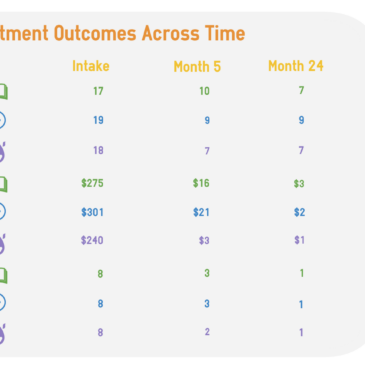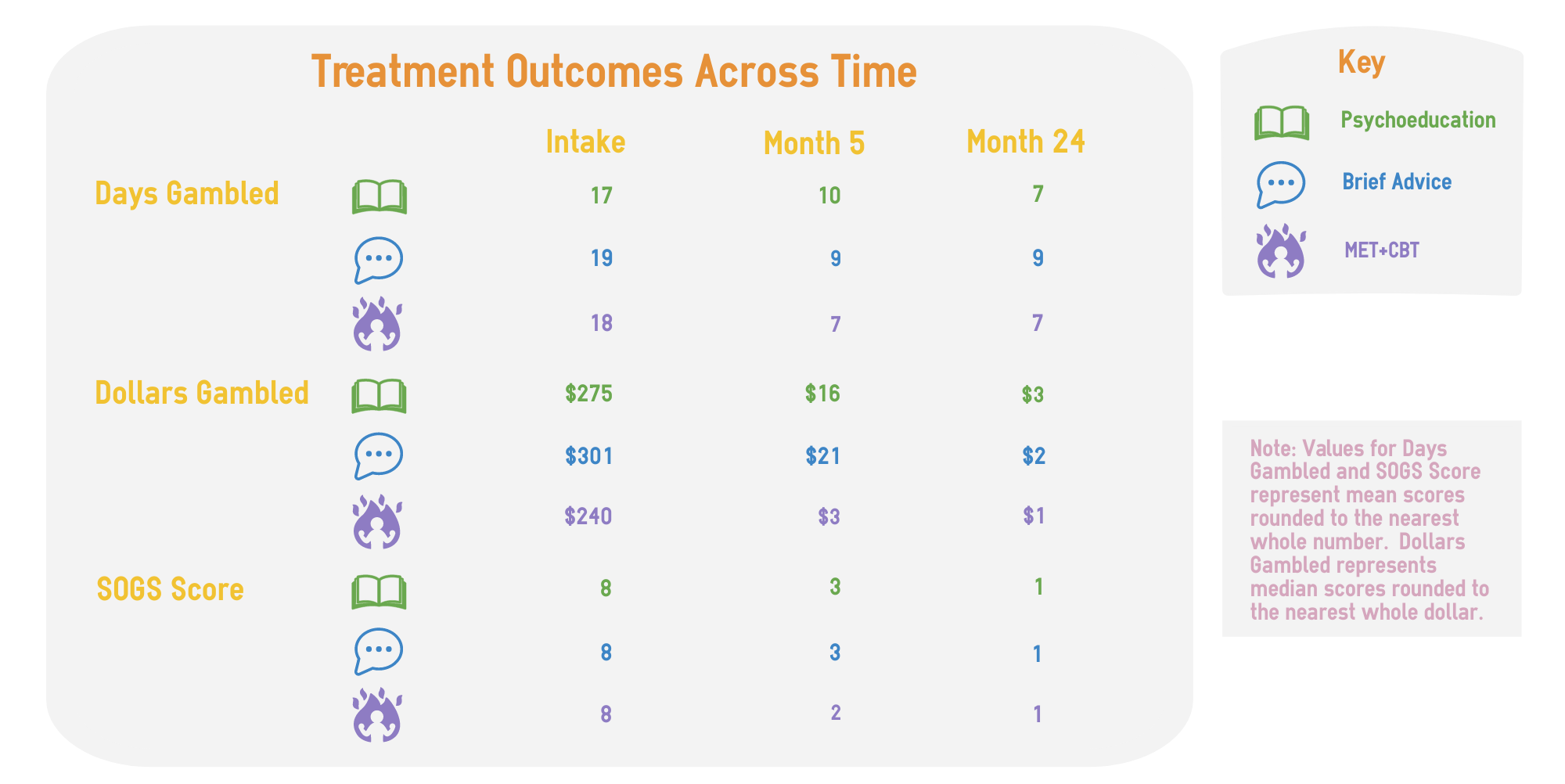People who experience gambling-related problems make up less than 3% of the general population, yet among people seeking treatment for substance use disorder, nearly 37% report gambling-related problems. Thus, people seeking treatment for substance use disorder might benefit from access to treatment for gambling disorder. This week, as part of our Special Series on Gambling Disorder, STASH reviews a study by Nancy Petry and colleagues that explores how different types of interventions might reduce gambling-related problems among people in substance use treatment.
What is the research question?
Is a brief intervention sufficient for reducing gambling-related problems among people in substance use treatment?
What did the researchers do?
The researchers recruited 217 participants from outpatient substance use treatment clinics. Participants were eligible to participate in this study if they (1) were 18 years or older; (2) met DSM-IV criteria for alcohol, cocaine, opioid, or marijuana use disorder; (3) gambled both more than four days and $100 in the past 2 months; and (4) scored higher than 3 in the past two months on the South Oaks Gambling Screen (SOGS). Participants were randomly assigned to receive psychoeducation1, brief advice2, or motivational enhancement therapy with cognitive behavioral therapy (MET+CBT)3. Researchers followed-up with the participants 7 times over the next 24 months. At each follow-up, participants were assessed for past-30-day number of days gambled, dollar amount gambled, and SOGS score. The researchers used Hierarchical Linear Models to assess changes in scores across each time period.
What did they find?
Participants in all three treatment groups showed significant declines across all three measures (i.e., number of days gambled, number of dollars gambled, and SOGS scores) between their intake assessment and the end of the study at Month 24. Scores across all measures for all three treatment groups declined rapidly between month one and month five, then showed a gradual decrease until the 24th month. (See Figure 1). Participants in the MET+CBT group showed the greatest initial decreases across all measures at Month 5. Among the two brief interventions (i.e. brief advice and psychoeducation), participants in the brief advice group showed a larger decrease in days gambled and dollars gambled at Month 5.
Figure. Past-thirty-day self-report of days gambled, dollars gambled, and SOGS score across treatment types and time. Click image to enlarge.
Why do these findings matter?
Because participants in all three groups improved, these findings suggest that people in therapy for substance-related problems might naturally learn coping strategies to reduce gambling-related problems. However, both MET + CBT and brief advice led to larger improvements at Month 5. This suggests that adding treatment for gambling disorder might reduce gambling-related problems at a faster rate. Eliminating or reducing these problems earlier in treatment might allow people to focus more on substance use-related problems. Brief advice might be an effective alternative to MET + CBT for organizations that do not have the funding or resources to implement full MET + CBT programs.
Every study has limitations. What were the limitations in this study?
It is unclear why the MET+CBT group experienced more rapid declines in gambling-related problems. The researchers did not ask questions about how participants used treatment guidelines between each assessment period. Few participants returned for follow-up CBT sessions in the MET+CBT condition. The increased effectiveness of this condition compared to the others might be related to MET rather than CBT. The results of this study might not be generalizable to people who experience both gambling- and substance-related problems but who do not seek treatment.
For more information:
If you think that you or anyone you know might be experiencing substance use or gambling-related problems, you can find help resources on the BASIS addiction resources page.
— Pat Williams
What do you think? Please use the comment link below to provide feedback on this article.
________________
[1] Participants assigned to Brief Psychoeducation received a one-page handout regarding the relation between gambling, drug use, mood, and legal problems.
[2] Participants assigned to Brief Advice received a one-page hand out and verbal advice for how to reduce gambling-related problems.
[3] Participants assigned to MET+CBT received a 50-minute MET session where they received feedback regarding their gambling. Participants were then encouraged to return for three sessions of CBT over the next three weeks.






Randy Ringaman March 21, 2018
Have any studies been done with regard to the use of “Acclerated Resolution Therapy” (ART)?
Pat Williams March 22, 2018
Hi Randy,
I looked at the available research on the PsycINFO and the HOLLIS search engines (8 on PsycINFO and 23 on HOLLIS). Nearly every study relates to the application of ART among populations of veterans with PTSD. None seem to relate to gambling disorder.
You raise a great question. How do you think this type of treatment might influence gambling disorder outcomes?
All the best,
Pat Williams